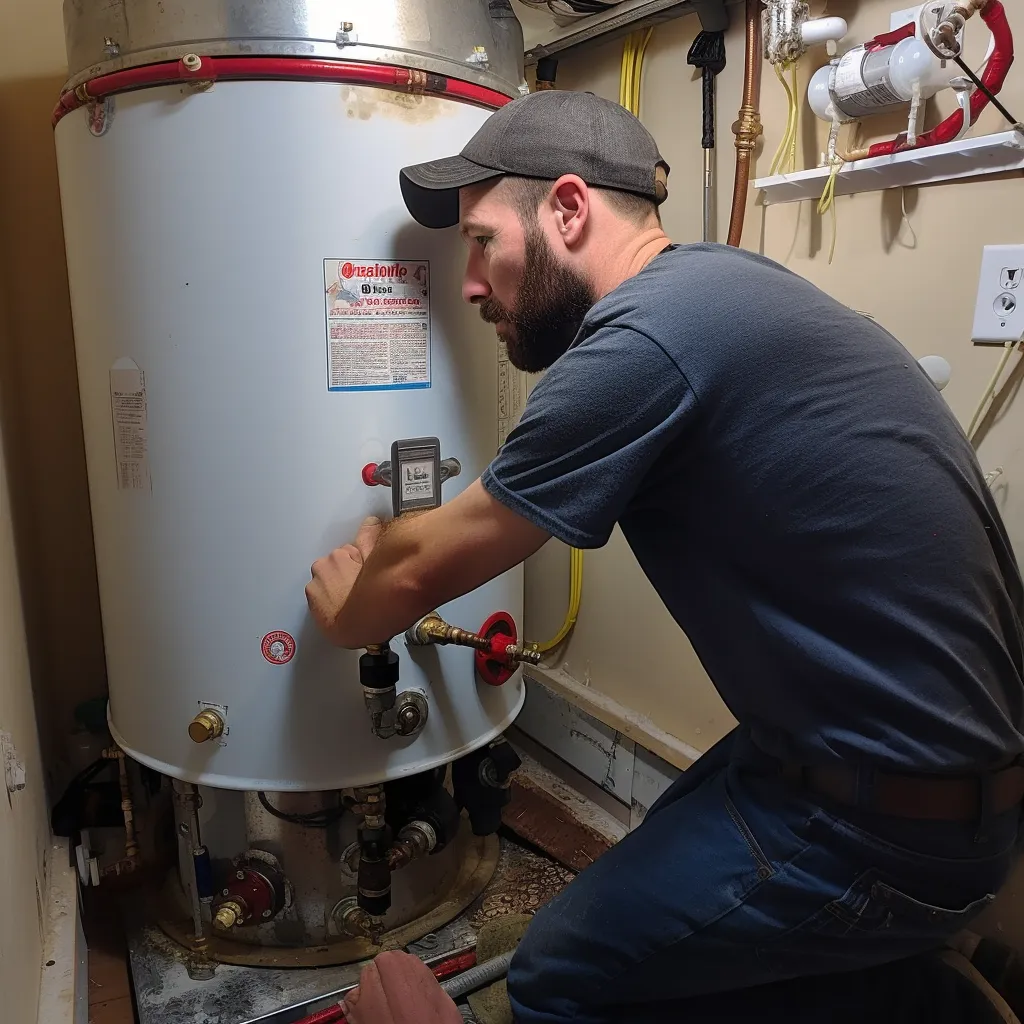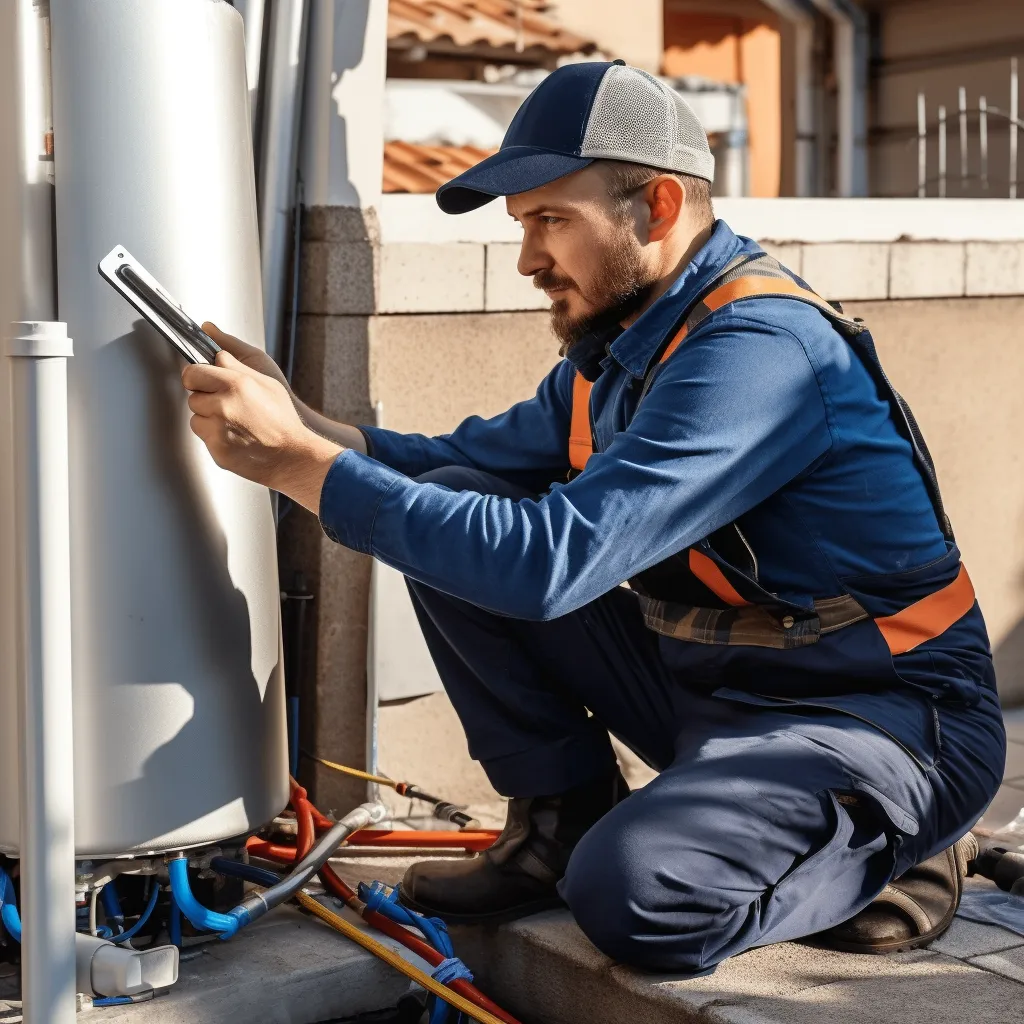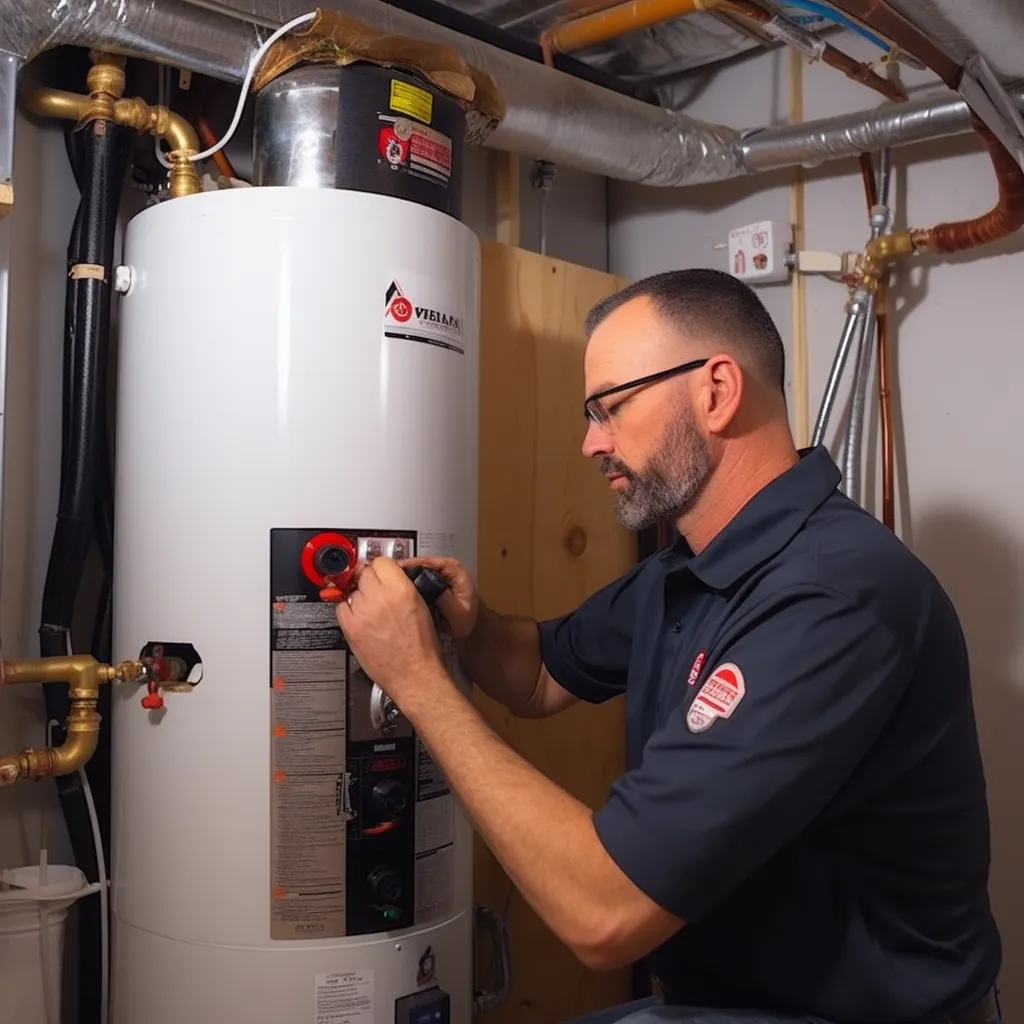Types of Water Heaters: Which One is Best for Your Santa Fe Home?
Selecting a new water heater can feel overwhelming given the wide range of options available, such as traditional tanks, solar units, and tankless models. Each type offers varying levels of energy efficiency and hot water capacity. To help you make an informed decision based on your family's needs, our comprehensive guide provides a detailed review of each water heater type. By reading further, you'll be well-equipped to choose the right water heater for your home. It's essential to carefully consider the unique advantages and disadvantages of each type before finalizing your decision.

Traditional Storage Tank Water Heaters
Tank-style water heaters are a popular and efficient choice for heating and storing water in insulated tanks. They use gas, electric, or oil as an energy source to heat the water. These units ensure a continuous supply of hot water, readily available whenever you need it with a simple turn of the tap.
Pros:
Lower cost: Tank-style water heaters generally have a more affordable upfront cost compared to other types of water heaters, making them an attractive option for budget-conscious homeowners.
Longer warranty periods: Many tank-style water heaters come with longer warranty periods, providing extended protection and peace of mind against potential issues or malfunctions.
Ease of maintenance: Maintenance for tank-style water heaters is usually straightforward and doesn't require complex procedures. This simplicity makes it easier to perform regular maintenance tasks, ensuring the longevity and optimal performance of the unit.
Cons:
High operating expenses: Traditional water heaters are known for their lower energy efficiency, which can result in higher operating expenses over time. This is because the tank continually heats and stores water, even during periods of low usage, leading to energy wastage.
Limited capacity: The size of the tank determines the amount of hot water available at any given time. If the demand exceeds the tank's capacity, it can lead to a shortage of hot water during peak usage periods, requiring some waiting time for the tank to refill and reheat the water.
Risk of water damage: There is always a risk of water damage if the tank develops a leak or fails. A leaking or burst tank can result in significant water damage to the surrounding area, potentially requiring costly repairs and restoration. Regular inspection and maintenance are essential to minimize this risk.


Tankless Water Heaters
Tankless water heaters provide a modern and efficient alternative to traditional water heaters. Unlike tank-style models that continuously store and heat water, tankless units heat water on demand. This approach saves energy and frees up valuable space in your home. Although the upfront cost of a tankless water heater may be higher, the long-term savings on utility bills compensate for it. With their energy-saving benefits, tankless water heaters offer a more eco-friendly and cost-effective solution for meeting your hot water needs.
Pros:
Easy installation: Tankless water heaters have a compact design, making installation straightforward and flexible, especially in homes with limited space.
High energy efficiency: Tankless water heaters are known for their energy-saving capabilities. By heating water on demand, they eliminate the energy losses associated with storing hot water in a tank, resulting in consistently lower monthly energy bills.
Continuous hot water supply: With a tankless water heater, you won't run out of hot water as long as there is a demand. They provide a continuous supply, making them ideal for households with high hot water usage or multiple simultaneous hot water needs.
Longer lifespan: Tankless water heaters typically have a longer lifespan compared to traditional tank-style water heaters. This longer lifespan makes them a smart and economical investment in the long run, as they require less frequent replacement or repairs.
Cons:
Higher initial cost: Tankless water heaters tend to have a higher upfront cost compared to traditional water heaters. However, the long-term energy savings and extended lifespan often offset this initial investment.
Venting complexities in small spaces: Tankless water heaters may require specific venting systems, especially when installed in small or confined spaces. Ensuring proper ventilation can add complexity to the installation process.
Limited capacity for high-demand applications: While tankless water heaters provide a continuous supply of hot water, they do have a maximum flow rate. This means that if multiple high-demand applications, such as running multiple showers simultaneously, exceed the unit's capacity, there may be a reduction in water flow or temperature. Proper sizing is crucial to ensure sufficient hot water supply for your specific needs.
Heat Pump Water Heaters
Heat pump water heaters are highly regarded for their exceptional efficiency and cost-effectiveness in heating water. These units utilize a small compressor to extract heat from the surrounding air, making them a remarkably energy-efficient option. The beauty of heat pump water heaters lies in their ability to provide hot water without consuming a significant amount of energy, resulting in substantial cost savings over time. Furthermore, these water heaters can operate without electricity, making them a reliable source of hot water even during power outages. Embrace the benefits of efficient and affordable hot water by opting for a heat pump water heater.
Pros:
Energy efficiency: Heat pump water heaters are highly energy efficient, which can lead to significant reductions in utility bills compared to traditional water heaters. By extracting heat from the air, they utilize renewable energy sources effectively.
Renewable energy utilization: These water heaters harness renewable energy from the air, making them a more sustainable and environmentally friendly option. By reducing reliance on fossil fuels, they contribute to a greener and cleaner energy footprint.
Continuous hot water during power outages: One of the notable advantages of heat pump water heaters is their ability to provide hot water even during power outages. Unlike electric or gas-powered heaters that rely on external power sources, heat pump water heaters can operate independently, ensuring a continuous supply of hot water during emergencies or power disruptions.
Cons:

Higher initial cost: Heat pump water heaters typically have a higher upfront cost compared to traditional water heaters. While the long-term energy savings can offset this initial investment, it's important to consider the initial budget required.
Ventilation and space requirements: Heat pump water heaters may have specific ventilation requirements and require adequate space for installation. This can add complexity to the installation process, especially in homes with limited space or specific layout constraints.
Limited capacity: Heat pump water heaters may have a limited capacity in terms of the amount of hot water they can provide per usage. This means that in situations of high hot water demand, such as multiple showers running simultaneously, there may be a reduction in water flow or temperature. Proper sizing and consideration of hot water needs are important to ensure adequate supply for your household's requirements.

Heat Pump Hybrid Water Heaters
Heat pump hybrid water heaters offer the advantages of both conventional storage tank water heaters and heat pump systems. These units provide high efficiency and lower operating costs compared to traditional models. Although they may require a higher initial investment, their superior functionality and effectiveness make them a worthwhile choice for homeowners seeking energy-efficient water heating solutions.
Pros:
Increased energy efficiency, reducing utility bills.
Renewable energy utilization for sustainability.
Hot water availability during power outages.
Longer lifespan compared to traditional storage tank heaters.
Cons:
Higher initial cost compared to conventional storage water heaters.
Potential ventilation and space requirements that may pose installation challenges.
Limited capacity, resulting in a finite amount of hot water available for each use.
Risk of water damage if the tank fails or leaks.
Solar Powered Water Heaters
Solar-powered water heaters offer an excellent opportunity to reduce monthly utility bills and harness renewable energy. There are two main types available: active and passive systems. These systems utilize the sun's energy to heat stored water, providing a straightforward and cost-effective method to save money on energy expenses. By opting for a solar-powered water heater, homeowners can enjoy the benefits of reduced energy costs while embracing a more sustainable and environmentally friendly approach to heating water.

Active Systems:
Active solar-powered water heaters operate by utilizing pumps to transfer hot fluid from the solar collectors to a storage tank for future use. These systems are highly efficient and capable of generating significant amounts of hot water. By utilizing active systems, you can optimize the collection of solar energy and ensure an ample supply of hot water to meet the needs of your household.
Passive Systems:
Passive solar water heaters operate by relying on natural convection to transport heated fluid from the solar collectors to a storage tank, utilizing solar power to heat the water. These systems are known for their low installation and maintenance costs. While they may not provide as much hot water as active systems, passive solar water heaters are a cost-effective and environmentally friendly option for harnessing solar energy to meet your hot water needs.
Pros:
High efficiency, resulting in cost savings on energy bills.
Utilization of renewable energy from the sun.
Longer lifespan compared to traditional water heaters.
Cons:
Higher initial cost compared to traditional storage tank heaters.
Additional space and equipment requirements may complicate installation.
Risk of water damage if solar panels become faulty or damaged.


Point-of-Use Water Heaters
Point-of-use water heaters provide the convenience of hot water on demand in a compact and efficient system. They are especially well-suited for small spaces or as an alternative to traditional storage tanks to avoid associated costs and inefficiencies. By delivering hot water directly at the point of use, these heaters eliminate the need for long pipe runs and minimize heat loss, ensuring quick and efficient hot water delivery.
Pros:
High energy efficiency, resulting in lower utility expenses.
Compact size, suitable for small spaces.
Longer lifespan compared to storage tank heaters.
Cons:
Higher initial cost and potential need for extra ventilation and installation space.
Lower hot water capacity, resulting in limited availability per use.
Higher risk of water damage due to tank failure or leaks in tankless heaters.
Water Heaters With Hydronic Boilers
Hydronic boilers are an efficient heating system that utilizes water, rather than air, to circulate heat throughout your space. They are capable of providing both hot water for domestic use and space heating, making them well-suited for colder climates. In addition, hydronic boilers can be paired with tank water heaters to meet your hot water needs in a more affordable manner.

Pros:
High efficiency, resulting in lower utility bills.
Provides both space heating and domestic hot water.
Compact design for easy installation in tight spaces.
Longer life expectancy compared to traditional tank water heaters.
Cons:
Higher initial cost compared to traditional storage models.
Limited capacity, resulting in a lesser amount of hot water available per use.
Possibility of noise generation during operation, which may be a consideration for noise-sensitive environments.
Potential ineligibility for certain utility rebates or incentives, as not all programs may include hydronic boilers in their eligibility criteria.


Smart Water Heaters
Upgrade your water heating system to the latest technology with smart water heaters, offering efficient hot water production. With Wi-Fi enabled thermostats, you can conveniently manage your hot water consumption and expenses from anywhere. Take control of temperature settings and customize them to meet your specific needs, all through your smartphone. Enjoy the benefits of modern technology and enhance your hot water experience with smart water heaters.
Pros:
Remote control via Wi-Fi enabled thermostat for convenient management.
Energy-saving modes, such as vacation mode, to reduce energy bills.
Compact size for easy installation and maintenance in tight spaces.
Longer life expectancy compared to traditional storage tank heaters.
Cons:
Higher cost compared to traditional storage water heaters.
Some utility rebates or incentives may not apply to smart water heaters.
Additional software updates may be required for compatibility with newer devices.
Potential security risks if the Wi-Fi connection is not secure.

Condensing Water Heaters
Condensing water heaters combine the benefits of tankless and conventional storage tank water heaters, creating an innovative and efficient solution. These models utilize advanced technology to extract heat from exhaust gases, maximizing efficiency and resulting in cost savings. By capturing and utilizing heat that would otherwise be wasted, condensing water heaters deliver better performance and increased energy efficiency compared to traditional models. With their ability to optimize heat transfer, condensing water heaters provide an excellent choice for homeowners seeking improved energy efficiency and cost-effective water heating solutions.
Pros:
High energy efficiency, resulting in lower utility bills.
Longer lifespan compared to traditional tank water heaters.
Hot water availability during power outages.
Cons:
Higher initial cost.
Space and ventilation requirements for installation.
Limited hot water capacity.
Risk of water damage in case of tank failure or leakage.

Choosing the fight water heater for your household
Choosing the right size water heater is crucial to ensure an adequate supply of hot water without unnecessary costs or space constraints. A water heater that is too small may result in insufficient hot water for your needs, while an oversized one can be wasteful and take up unnecessary space. To determine the ideal water heater size for your family's needs, consider your lifestyle and daily hot water usage. Evaluate factors such as the number of household members, peak hot water usage times, and specific activities that require hot water. By selecting the appropriate size, you can enjoy affordable home comfort and an ample supply of hot water that meets your requirements.

When should you
replace your water heater?
A properly functioning water heater is essential for the efficient operation of your home's plumbing system, providing hot water for everyday tasks such as showering, dishwashing, and laundry. Typically, water heaters have a lifespan of around 10-15 years. If your water heater has already reached or exceeded this lifespan, it is advisable to start considering investing in a new one. Upgrading to a newer model ensures a reliable hot water supply and helps prevent potential issues and expensive repairs associated with an aging unit. By proactively replacing your water heater, you can maintain the smooth functioning of your plumbing system and avoid the inconvenience and costs of a failing unit.
Here are some signs that it may be time to consider replacing your water heater:
If your water heater is approaching or exceeded its expected lifespan.
Inadequate hot water supply.
Leaks or signs of corrosion.
Strange noises coming from the water heater.
High energy bills without a significant change in water usage.
Frequent repairs or recurring issues.
While the initial cost of installing a new water heater may be substantial, the long-term advantages of improved energy efficiency and reliable performance make it a worthwhile investment. Hiring a licensed plumber is essential in evaluating your specific needs, recommending the appropriate type and size of water heater, and ensuring proper installation for optimal efficiency and longevity. By seeking professional assistance, you can make an informed decision and enjoy the benefits of a well-functioning and energy-efficient water heating system in your home.
Maintenance tips for
water heater efficiency
Regular maintenance of your water heater is crucial to prevent issues and maintain its efficiency. By following simple maintenance routines, you can keep your water heater running smoothly, ensuring affordable and reliable hot water for your home.
What are the benefits of hiring a licensed plumber to replace your water heater?
When deciding whether to replace your water heater, you may be tempted to tackle the task yourself. However, there are significant advantages to hiring a professional plumber that should be considered. Here are some key points to keep in mind:

Expertise in selecting the right type and size of water heater for your needs.
Ensures compliance with building codes and safety standards.
Efficient troubleshooting and problem-solving during installation.
Possesses the necessary tools and equipment for a successful installation.
By hiring a licensed plumber for water heater replacement, you can save time, money, and avoid potential issues. Their expertise, cost-effective approach, and focus on safety ensure a smooth and reliable replacement process, giving you peace of mind and a properly functioning water heating system in your home.
Contact Us
GET IN FULL TOUCH
PHONE: (505) 448-0742
EMAIL:
patrick@santafewaterheater.com
Baca Specialty Services, Heating and Cooling HVAC
Sante Fe, NM 87508
